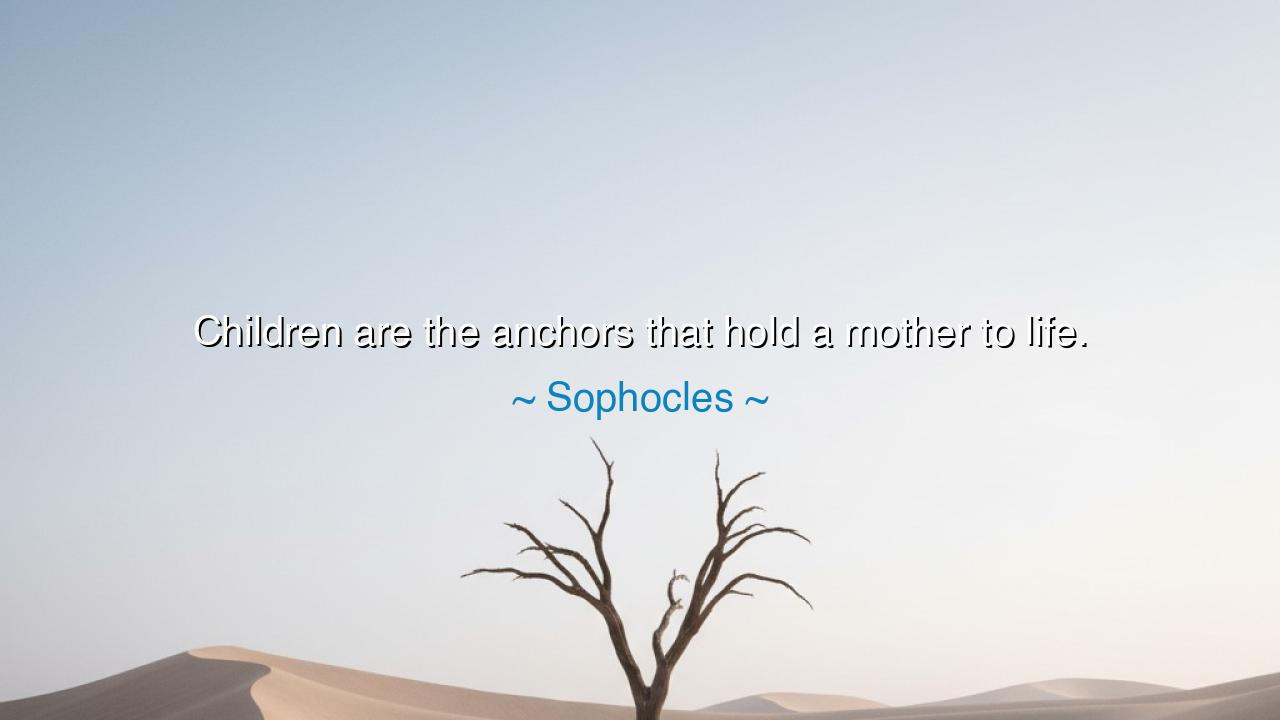
Children are the anchors that hold a mother to life.






Hear now the ancient voice of Sophocles, who wrote not only in tragedy but in timeless wisdom: “Children are the anchors that hold a mother to life.” In this utterance lies a vision as enduring as the mountains and as deep as the seas. For Sophocles, who gazed into the sorrows and triumphs of humanity, knew that the bond between mother and child is not a fragile thread but a chain of iron, binding her spirit to the very will to live. When storms arise and despair presses heavily upon her, it is her children who become the reason she endures, the weight that steadies her against the tempest of life.
The image of the anchor is not chosen lightly. In the ancient world, the anchor was a symbol of stability, hope, and salvation. When the seas raged, it was the anchor that kept the vessel from being cast into ruin. So too with the mother: when loneliness, grief, or hardship threaten to overwhelm her, the presence of her children holds her firm, reminding her that her life is not her own, but woven into the lives she has brought forth. The anchor does not free the ship from the storm, but it gives it purpose and endurance; in the same way, the child gives the mother a reason to remain steadfast.
Consider the story of Cornelia, mother of the Gracchi brothers in ancient Rome. After the death of her husband, she endured widowhood and hardship, yet refused to remarry, devoting herself entirely to the upbringing of her sons. When other noblewomen boasted of their jewels, she pointed to her children and declared, “These are my treasures.” They were her anchors, keeping her rooted in dignity, purpose, and strength, even amidst the difficulties of her time. Though her life was marked by sorrow, she found in her children the meaning that tethered her spirit to hope.
Even beyond antiquity, history tells us the same. During the horrors of the Second World War, many mothers in besieged lands pressed forward through hunger, fear, and loss only because of their children. Diaries of those who survived the bombings of London or the hunger of Leningrad reveal again and again that it was the sight of a child’s face, the sound of their cry, that gave a mother the will to keep walking when all else seemed lost. In this way, Sophocles’ ancient words echo across centuries: it is the children who are the anchors of her very existence.
Yet this truth is not only of sorrow and survival. It also speaks of joy. For a mother may look upon her children and see not only burdens to carry, but futures to shape. They draw her forward into life, reminding her that each day’s labor, each sacrifice, each sleepless night, is part of a greater tapestry. Her life expands beyond her own story, becoming intertwined with theirs. Thus her years are enriched with meaning, her days no longer drifting without purpose, but bound securely to the enduring mission of nurturing life.
The lesson is clear: honor this bond, for it is both fragile and unbreakable. To the mother, recognize that though life may cast heavy shadows, your children are not chains that weigh you down, but anchors that keep you steady, reminding you of your strength and your reason to press forward. To the child, understand that you are not merely a dependent, but a source of light and power to your mother—your very existence strengthens her will and gives her courage.
Practical actions flow from this truth. Mothers, cherish the presence of your children, even in moments of hardship, for they are the anchors that keep you tied to the sacred work of life. Children, honor your mothers, knowing that their endurance has been for your sake. Speak gratitude, offer respect, and live in a way that affirms the sacrifices they bore to keep you safe. And for all people, whether parent or child, let this teaching remind you that the bonds of love are not fleeting, but eternal, grounding us in times of storm.
Thus, let Sophocles’ wisdom endure: “Children are the anchors that hold a mother to life.” For in these words is revealed the holy mystery of survival, of purpose, and of love—that in the gift of a child, a mother finds not only the burden of responsibility, but also the unshakable strength to endure all trials, to live, and to hope again.






AAdministratorAdministrator
Welcome, honored guests. Please leave a comment, we will respond soon